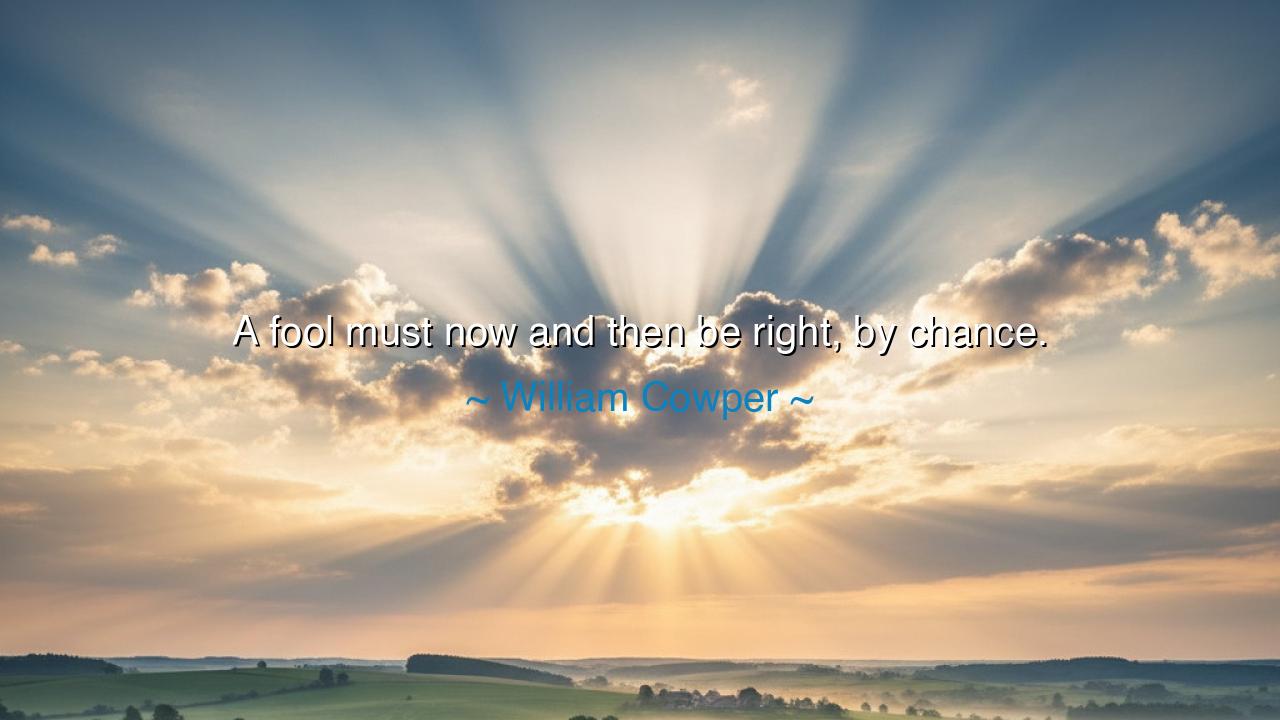
A fool must now and then be right, by chance.






In the words of William Cowper, "A fool must now and then be right, by chance," we are confronted with the humbling truth that even the most misguided among us can, on occasion, find themselves in alignment with truth or wisdom, if only through the whims of chance. Cowper’s quote reminds us of the unpredictability of life and the fallibility of human judgment. It reflects on the idea that while a fool may often be wrong, the tides of fate sometimes favor even those whose decisions are more based on impulse than reason. This moment of accidental correctness highlights the importance of humility in our own certainty and the understanding that even the wisest of us can be wrong, just as the most foolish can, from time to time, stumble upon truth.
The idea that a fool can occasionally be right due to chance resonates deeply with the ancient philosophy of chance versus destiny, an age-old debate about the forces that govern the universe. Heraclitus, the ancient Greek philosopher, believed in the idea of the Logos, a rational order that governs the cosmos. However, he also acknowledged that chaos and randomness were ever-present forces in life. For Heraclitus, the wisdom of the universe was not always immediately clear, and even a fool could, by the whim of chance, act in a way that aligned with the natural order. Cowper's words echo this ancient understanding—that chaos and order often intertwine in unpredictable ways, and even those we deem foolish may, at times, find themselves in the right.
Consider the example of the Oracle of Delphi in ancient Greece. The Pythia, the high priestess of Apollo, was believed to speak the words of the god himself. Yet, as many of the ancient stories tell, the prophecies given by the oracle were often cryptic and subject to misinterpretation. Even kings and wise philosophers, who sought the oracle’s counsel, sometimes found themselves acting upon advice that appeared to be illogical or misguided. However, by some twist of fate, the outcomes of these seemingly misguided actions often led to success, as if the gods themselves had guided the fools to the right choice. Cowper's quote thus reflects this ancient truth: that fate often favors those who are least expected to be right, and wisdom can sometimes emerge from the most unlikely places.
In the context of warfare, Alexander the Great provides a powerful historical example. Though he was one of the greatest military tacticians in history, Alexander was also known for moments of recklessness and daring decisions that seemed, at times, to be driven by impulsiveness rather than sound strategy. Yet, on numerous occasions, these bold actions turned the tide of battle, leading to victory and the expansion of his empire. It was, at times, his unconventional choices—those that seemed to defy logic—that led him to be right, if only by the chance that fortune favored him. In this way, Alexander's actions mirror the fool’s rare moments of accidental correctness: driven by chance, but nonetheless effective.
In life, we often place ourselves on a pedestal of certainty, believing that our judgments are always rooted in reason and wisdom. But Cowper reminds us of the humility we must have in our convictions, recognizing that even the most foolish ideas may, at times, align with truth by the mere fluke of chance. History is full of examples where those who acted with unwavering confidence in their wisdom were proven wrong, while those who stumbled through their decisions found themselves on the right path purely because of circumstance. This does not mean that we should abandon reason or abandon our pursuit of wisdom, but it does mean we must stay humble and open-minded, recognizing that chance and luck play roles in our successes, just as they do in the successes of the most unqualified among us.
The lesson Cowper imparts is one of humility and reflection. When we are certain in our own wisdom, we must remember that even a fool may find the right path, just as fate sometimes smiles upon the unprepared. It is a reminder that life is not a linear progression of right and wrong, but a winding journey of uncertainty, where chance and choice intertwine. We must learn to accept the randomness of life, acknowledging that we, too, are subject to the whims of fate, and that the journey is filled with moments of serendipity—moments when the fool stumbles upon the truth, as much as the wise.
In our own lives, we must approach our decisions with both confidence and humility. We should trust our judgment, but we must also remain aware that life’s unpredictability can lead even the most uncertain among us to moments of clarity. Cowper teaches us that the path to wisdom is not always a straight line, but rather one filled with twists and turns, where even a fool may, through chance, find themselves in alignment with truth. Let us embrace this balance, knowing that while we may seek wisdom and certainty, we must also remain humble, accepting that even the unexpected can, at times, guide us toward the right answer.






AAdministratorAdministrator
Welcome, honored guests. Please leave a comment, we will respond soon